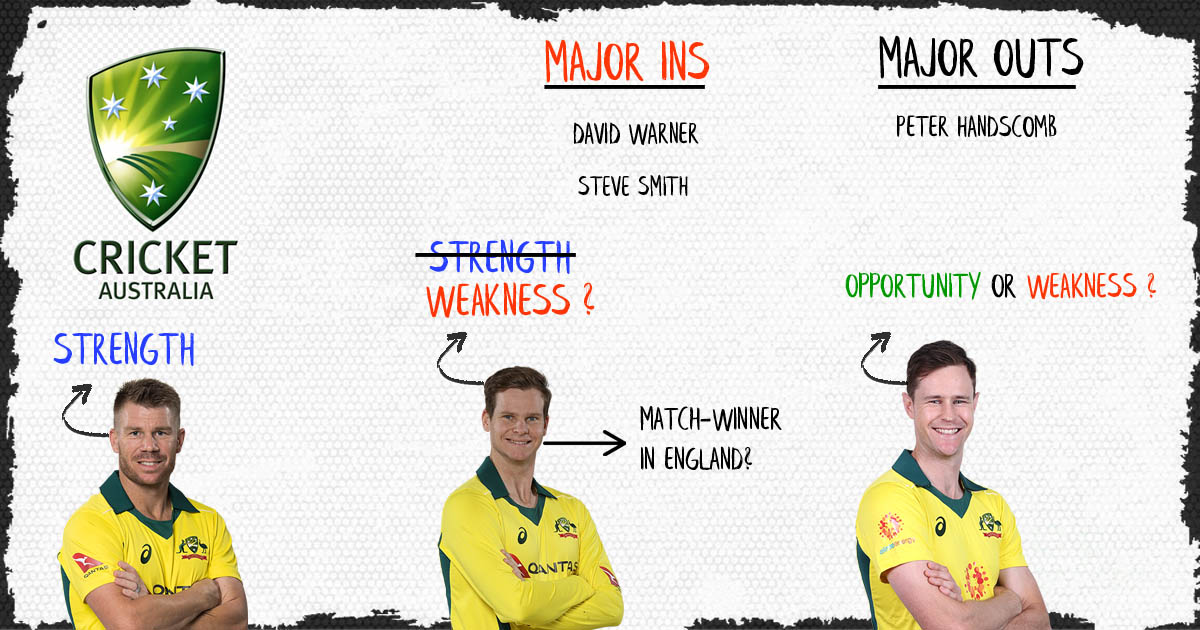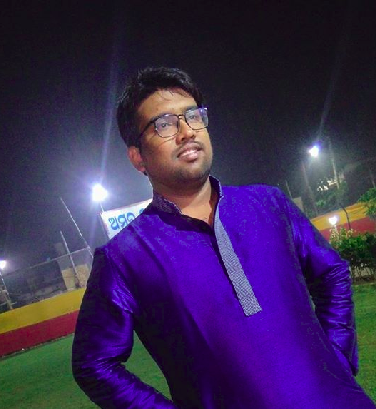ICC World Cup 2019 | SWOT Analysis - Australia
In a tournament as big as World Cup, preconceptions matter as much as realities. Either, you have to live upto the tag that you had acquired over the last few months or you will be suffering the wrath of ultimate online world - ask India, and they will tell you the curse of June 2017.

Sometimes, the present can be best understood by rolling the clock back. Even before Cameron Bancroft stuck his hand down his pants in what came as one of the most talked-about controversies in the sport, Australian cricket had started becoming a house whose slabs were too weak to have strong support for its roof.
On that eventful day, though, it all fell down, leaving Australian cricket in a mess that was to leave the next 12 months with all the talk about culture reviews and playing cricket the right way. Amidst all that, the history of players donning the Baggy Green and the canary yellow as a symbol of achievement was nowhere close to being seen. This Australian team didn’t show up and left their partisan fans in sudden despair.
However, the smile returned as Aaron Finch led the team to a back-from-the-dead 3-2 victory over India in March and followed that up with a series whitewash against Pakistan in UAE to ensure that they are still alive and kicking. For the first time in one year, the discussion was not about when Steve Smith and David Warner would come back but who would they replace.
It came to a point when Peter Handscomb - who had 479 runs to his name at an average of 43.54 this year - missed out from the World Cup squad and Usman Khawaja - who since returning to the ODI setup at the start of 2019 has scored 769 runs at 59.15 with two hundred and six half-centuries - is not even a sure-shot starter as an opener. And now, with the mega event starting in a week’s time, just like that, Australia are back as one of the favourites to lift the trophy and probably has one of the strongest teams on paper.
Strengths
In a long tournament, back-up options are like gold dust and in that regard, Australia would be breathing easy, majorly thanks to the return of David Warner and Steve Smith. Khawaja, after being touted as a Test player all his life, scored two centuries and a ninety across a five-match series against India away from home and realistically, he would like to believe that he deserves his chance in the top of the order. Finch had already announced that he would open with one among Khawaja and Warner to keep the left-right combination, and in that case, one of the duo will drop down to the No. 3 position.
Warner batted at No. 3 in the Brisbane practice games against New Zealand, giving rise to the possibility of the same happening in the World Cup, but that can help them in a different way as well. If the team can get off to a good start and would look to build on the path they had traversed, it would be easy for them to give rest anyone of the trio to manage the lethargy they might pick up during the tournament. With Shaun Marsh a sure starter thanks to his last year ODI performance, and Smith hitting an unbeaten 91 to go with Glenn Maxwell’s flamboyant 70 third match against a New Zealand XI, it is almost confirmed that Australia have the luxury very much demanded for an ODI match in England.
Again, who can disagree with the pure pedigree power that Warner and Smith bring to the table? Even though Smith is not as good in ODIs as he has been in Tests, it should be understood that he still averages more than 40 in ODIs and combine that with Warner’s audacious IPL form, teams would do well not to be overconfident against Australia.
The leg-spinning revolution is real. It is in India, in Afghanistan, and in South Africa, Pakistan everywhere. How could Australia not be in the same line? Adam Zampa may not be as effective as Rashid Khan, but Virat Kohli would vouch for his ability. The leg-spinner’s ability to drift it without any real change in angle and the resultant pace that came with it made him a valuable commodity for Australia in the unforgiving English cauldron.
Australia’s one of the biggest ODI games in the last year is Pat Cummins as the quick is in the form of his life, having just won the Allan Border Medal for Australia’s best player of the last year. He might be a better Test bowler, but the way he operated in India and UAE gave Australia a genuine case to build for its speedster. England’s flat and fast deck may interest him because he operated in the dictum that bounce is the key. In such a scenario, Australia hold a better chance.
Weaknesses
Australia’s problems are more deep-rooted than it meets the eye. Usman Khawaja scored 104, 100, 98, 91 and 88 among his team’s last eight wins and formed a prolific partnership with Aaron Finch. However, with Warner return, the situation has become more complicated. Warner has been a career opener, but a brisk starter. But Khawaja is a slow starter, and is statistically, ineffective at No.3 as well. So conventional wisdom suggests that Khawaja should open, but that makes Warner a bit ineffective too, considering the importance of powerplay runs in England.
Although Australia’s middle-order looks potent with Glenn Maxwell but the position preceding him needs some context. Well, Steve Smith is a match-winner in any part of the world, but is he a match-winner in England? With big bats and road tracks taking centre-stage, there was hardly any place for wizardry and his contribution may end up being as little as Aragorn’s management of Fellowship of the Ring on its way to Mordor.
That said, Mitchell Starc is no more threatening too as he was in 2015. He’s played only three ODIs in the last 16 months and him being the spearhead of the attack in a condition which has forgotten how to move the ball is too much to ask for. Injury to Jhye Richardson came at the worst possible time as the team has lost a potent pacer for the World Cup.
Opportunities
The scheduling definitely came as the biggest solace for the Aussies. They have a realistic chance of winning five out of the first six matches pretty comfortably, barring the game against India. While the Aaron Finch-led team will take on England, South Africa and New Zealand in the last three league matches, they will definitely look to secure at least four wins in the first half of the tournament which will keep them in good stead.
Threats
It is again their bowling. Jason Behrendorff is good, but is he good enough? The England-Pakistan series worked as a steely reminder of the things to come in the upcoming series and it is a man with a healthy sense of perspective wouldn’t downplay it. With Behrendorff going for runs in the IPL, there is a question mark over his run-restricting temperament and if that goes awry, Cummins and Starc could hardly help the cause.
SportsCafe Best XI : Aaron Finch (captain), Usman Khawaja, David Warner, Steve Smith, Glenn Maxwell, Marcus Stoinis, Alex Carey, Pat Cummins, Mitchell Starc, Nathan Coulter-Nile, Adam Zampa
Squad: Aaron Finch (captain), Usman Khawaja, David Warner, Steve Smith, Shaun Marsh, Glenn Maxwell, Marcus Stoinis, Alex Carey, Pat Cummins, Mitchell Starc, Kane Richardson, Nathan Coulter-Nile, Jason Behrendorff, Nathan Lyon, Adam Zampa.
Cricket FootBall Kabaddi
Basketball Hockey
SportsCafe
Cricket FootBall Kabaddi
Basketball Hockey
SportsCafe

Comments
Sign up or log in to your account to leave comments and reactions
0 Comments